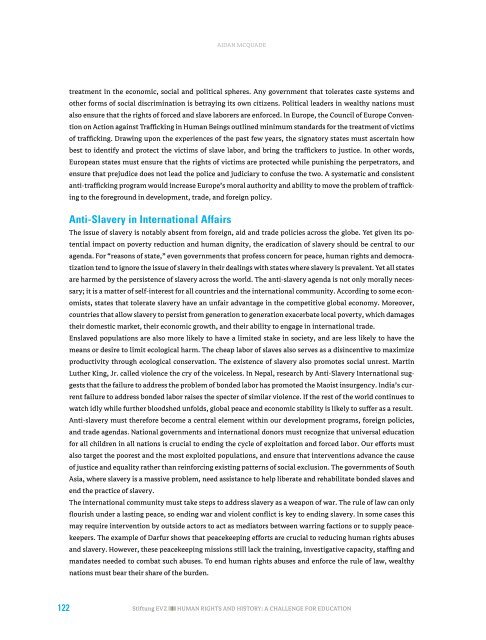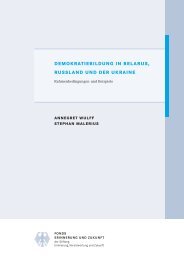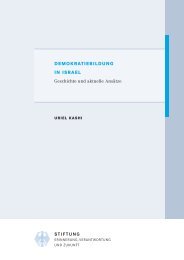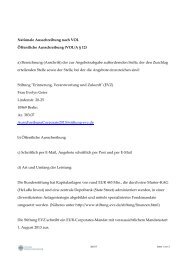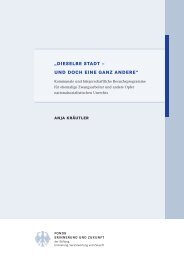chapter 2 - Stiftung "Erinnerung, Verantwortung und Zukunft"
chapter 2 - Stiftung "Erinnerung, Verantwortung und Zukunft"
chapter 2 - Stiftung "Erinnerung, Verantwortung und Zukunft"
Create successful ePaper yourself
Turn your PDF publications into a flip-book with our unique Google optimized e-Paper software.
Aidan McQuade<br />
treatment in the economic, social and political spheres. Any government that tolerates caste systems and<br />
other forms of social discrimination is betraying its own citizens. Political leaders in wealthy nations must<br />
also ensure that the rights of forced and slave laborers are enforced. In Europe, the Council of Europe Convention<br />
on Action against Trafficking in Human Beings outlined minimum standards for the treatment of victims<br />
of trafficking. Drawing upon the experiences of the past few years, the signatory states must ascertain how<br />
best to identify and protect the victims of slave labor, and bring the traffickers to justice. In other words,<br />
European states must ensure that the rights of victims are protected while punishing the perpetrators, and<br />
ensure that prejudice does not lead the police and judiciary to confuse the two. A systematic and consistent<br />
anti-trafficking program would increase Europe’s moral authority and ability to move the problem of trafficking<br />
to the foregro<strong>und</strong> in development, trade, and foreign policy.<br />
Anti-Slavery in International Affairs<br />
The issue of slavery is notably absent from foreign, aid and trade policies across the globe. Yet given its potential<br />
impact on poverty reduction and human dignity, the eradication of slavery should be central to our<br />
agenda. For “reasons of state,” even governments that profess concern for peace, human rights and democratization<br />
tend to ignore the issue of slavery in their dealings with states where slavery is prevalent. Yet all states<br />
are harmed by the persistence of slavery across the world. The anti-slavery agenda is not only morally necessary;<br />
it is a matter of self-interest for all countries and the international community. According to some economists,<br />
states that tolerate slavery have an unfair advantage in the competitive global economy. Moreover,<br />
countries that allow slavery to persist from generation to generation exacerbate local poverty, which damages<br />
their domestic market, their economic growth, and their ability to engage in international trade.<br />
Enslaved populations are also more likely to have a limited stake in society, and are less likely to have the<br />
means or desire to limit ecological harm. The cheap labor of slaves also serves as a disincentive to maximize<br />
productivity through ecological conservation. The existence of slavery also promotes social unrest. Martin<br />
Luther King, Jr. called violence the cry of the voiceless. In Nepal, research by Anti-Slavery International suggests<br />
that the failure to address the problem of bonded labor has promoted the Maoist insurgency. India’s current<br />
failure to address bonded labor raises the specter of similar violence. If the rest of the world continues to<br />
watch idly while further bloodshed unfolds, global peace and economic stability is likely to suffer as a result.<br />
Anti-slavery must therefore become a central element within our development programs, foreign policies,<br />
and trade agendas. National governments and international donors must recognize that universal education<br />
for all children in all nations is crucial to ending the cycle of exploitation and forced labor. Our efforts must<br />
also target the poorest and the most exploited populations, and ensure that interventions advance the cause<br />
of justice and equality rather than reinforcing existing patterns of social exclusion. The governments of South<br />
Asia, where slavery is a massive problem, need assistance to help liberate and rehabilitate bonded slaves and<br />
end the practice of slavery.<br />
The international community must take steps to address slavery as a weapon of war. The rule of law can only<br />
flourish <strong>und</strong>er a lasting peace, so ending war and violent conflict is key to ending slavery. In some cases this<br />
may require intervention by outside actors to act as mediators between warring factions or to supply peacekeepers.<br />
The example of Darfur shows that peacekeeping efforts are crucial to reducing human rights abuses<br />
and slavery. However, these peacekeeping missions still lack the training, investigative capacity, staffing and<br />
mandates needed to combat such abuses. To end human rights abuses and enforce the rule of law, wealthy<br />
nations must bear their share of the burden.<br />
122<br />
<strong>Stiftung</strong> EVZ<br />
HUMAN RIGHTS AND HISTORY: A CHALLENGE FOR EDUCATION


